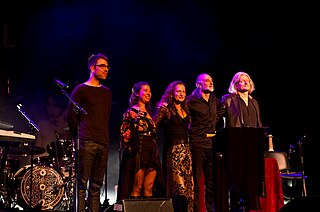O Virgo Splendens ("O Splendid Virgin") is a monodic [1] song (fol. 21v-22) from the Llibre Vermell de Montserrat, one of the oldest extant medieval manuscripts containing music. In modern times it has been recorded by many artists:

In poetry, the term monody has become specialized to refer to a poem in which one person laments another's death.

The Llibre Vermell de Montserrat is a manuscript collection of devotional texts containing, amongst others, some late medieval songs. The 14th-century manuscript was compiled in and is still located at the monastery of Montserrat outside Barcelona in Catalonia (Spain).

Medieval music consists of songs, instrumental pieces, and liturgical music from about 500 A.D. to 1400. Medieval music was an era of Western music, including liturgical music used for the church, and secular music, non-religious music. Medieval music includes solely vocal music, such as Gregorian chant and choral music, solely instrumental music, and music that uses both voices and instruments. Gregorian chant was sung by monks during Catholic Mass. The Mass is a reenactment of Christ's Last Supper, intended to provide a spiritual connection between man and God. Part of this connection was established through music. This era begins with the fall of the Western Roman Empire in the fifth century and ends sometime in the early fifteenth century. Establishing the end of the medieval era and the beginning of the Renaissance music era is difficult, since the trends started at different times in different regions. The date range in this article is the one usually adopted by musicologists.
- Jordi Savall, Hespèrion XX (album Llibre Vermell de Montserrat - siglo XIV, 1978)
- New London Consort directed by Philip Pickett (album Llibre vermell, pilgrim songs & dances, 1992)
- Ensemble Anonymus (album Llibre vermell, 1993)
- Qntal (album Qntal II , 1995)
- Studio der Frühen Musik directed by Thomas Binkley: "Llibre vermell" (album Secular music c1300, 1998)
- Schelmish (album Codex lascivus, 2002)
- Wolfenmond: "O virgo splendens" (album Wintersturm, 2005)
- Ensemble Rayuela (album Rayuela, 2006)
- Choeur de Chambre de Namur (album Llibre Vermell, 2007)

Jordi Savall i Bernadet is a Catalan conductor and viol player. He has been one of the major figures in the field of Western early music since the 1970s, largely responsible for popularizing the viol family of instruments in contemporary performance and recording. His characteristic repertoire features medieval, Renaissance and Baroque music, although he has occasionally ventured into the Classical and even the Romantic periods.

Hespèrion XXI is an international early music ensemble. The group was formed in Basel, Switzerland in 1974 as Hespèrion XX by Catalan musical director Jordi Savall, his wife Montserrat Figueras (soprano), Lorenzo Alpert, and Hopkinson Smith. The group changed its name to Hesperion XXI at the beginning of the 21st century. The name "Hespèrion" is derived from a word in Classical Greek which referred to the people of the Italian and Iberian peninsulas.
New London Consort was a London-based Renaissance and Baroque music ensemble, which performed in most of Europe and various other parts of the world. Founded and directed by Philip Pickett, most of its repertoire was recorded and broadcast by BBC and regularly appeared at major venues and festivals. This repertoire included unpublished works and new interpretations of familiar ones, sometimes controversial. The group has been inactive since its director's conviction as a sex offender in 2015.


